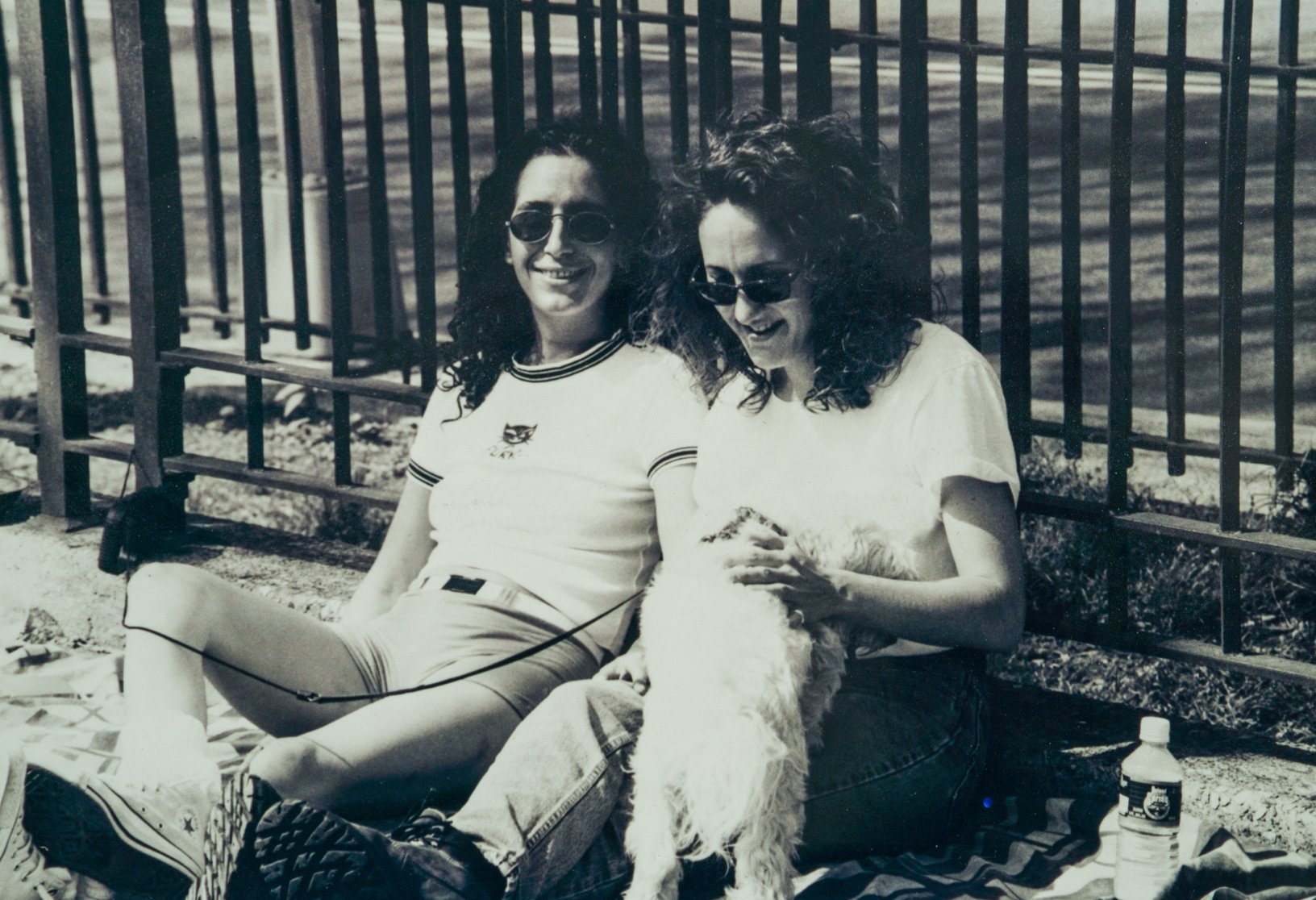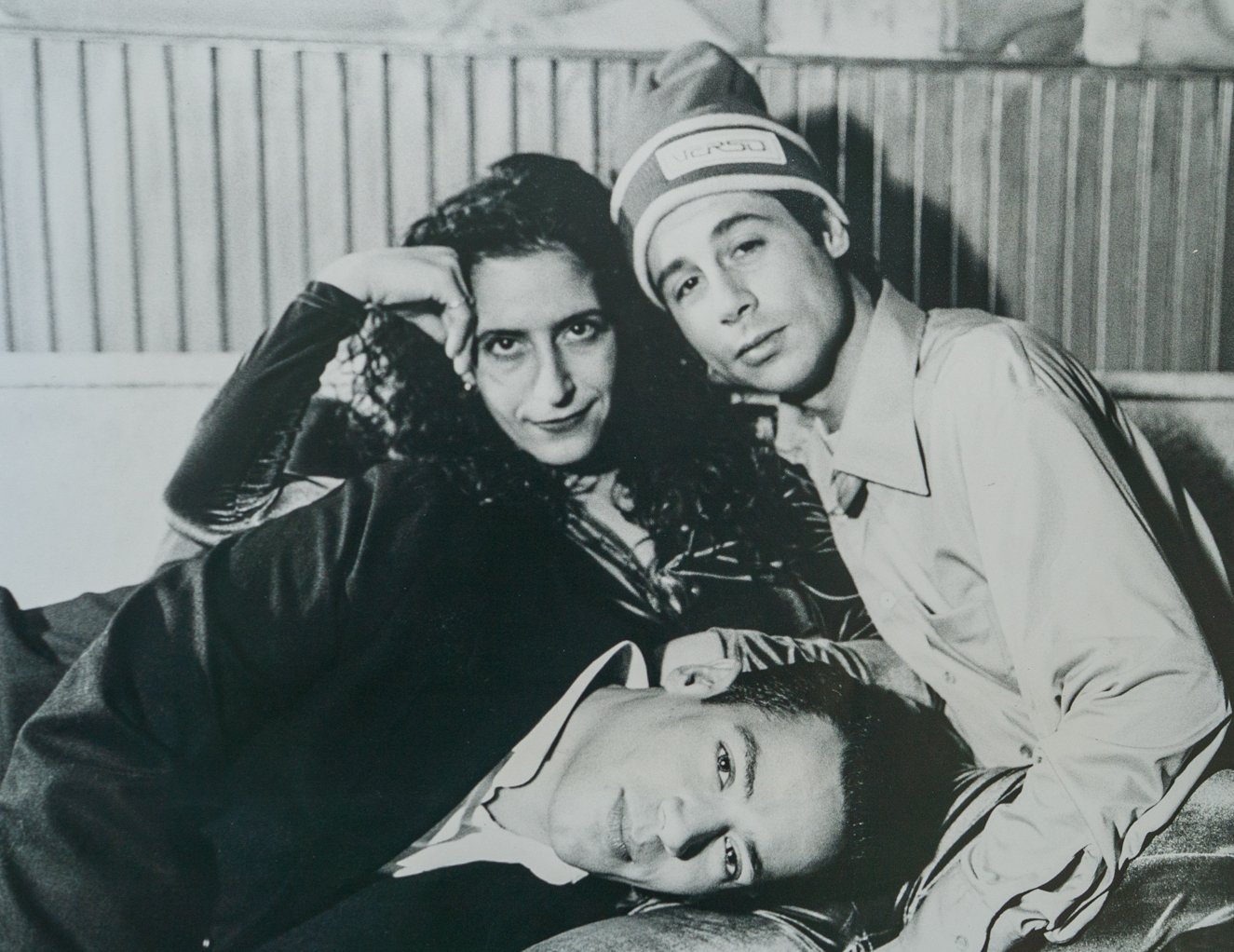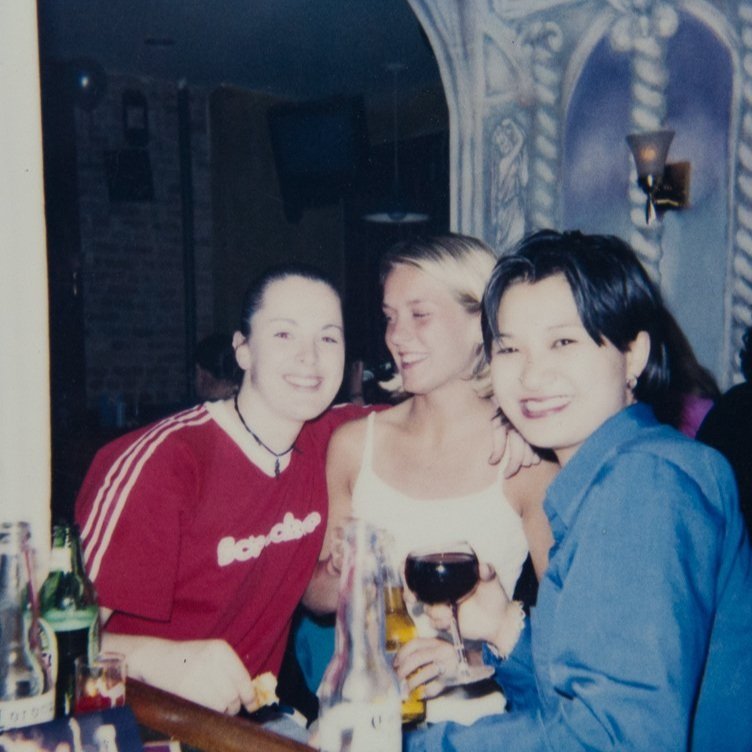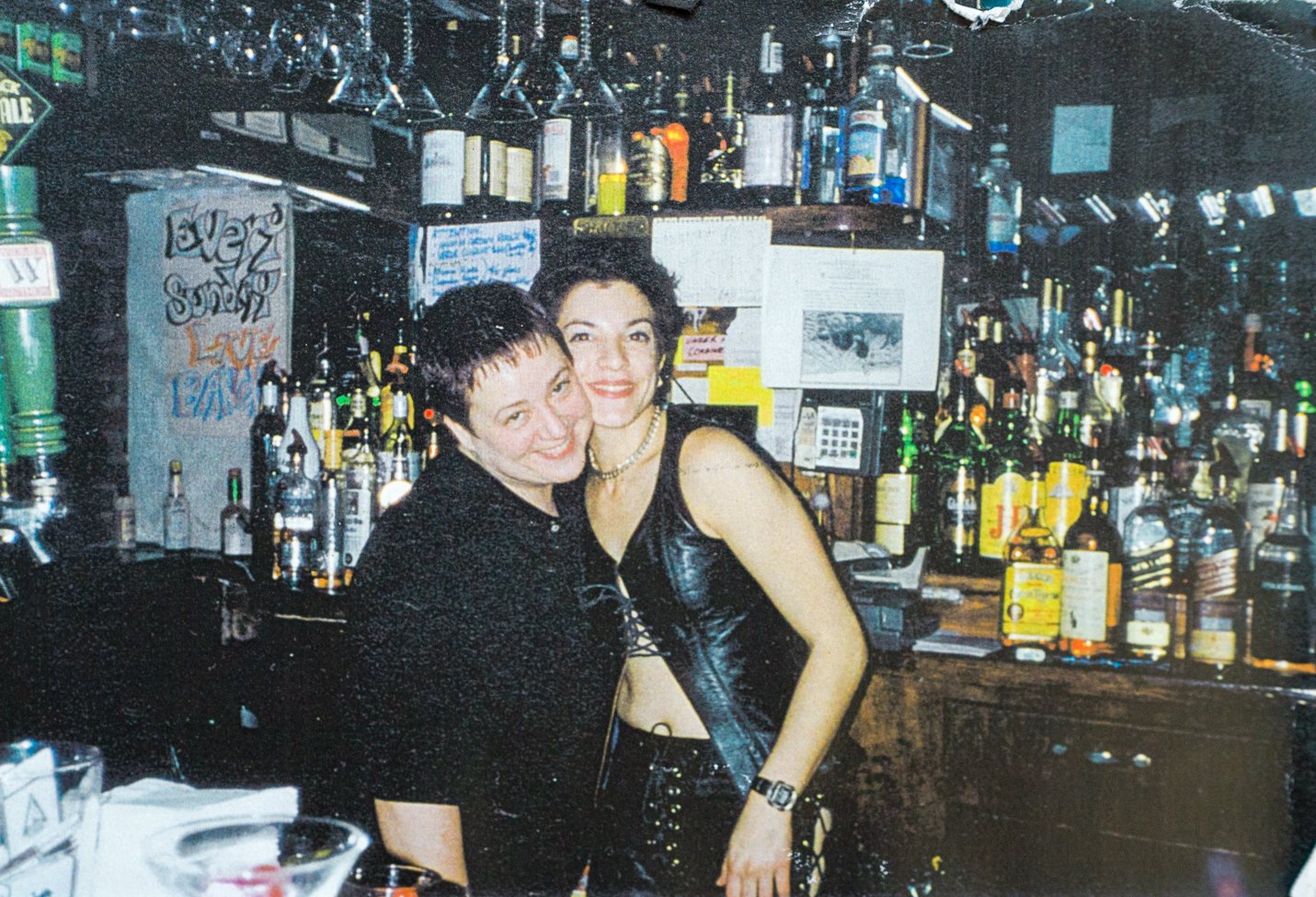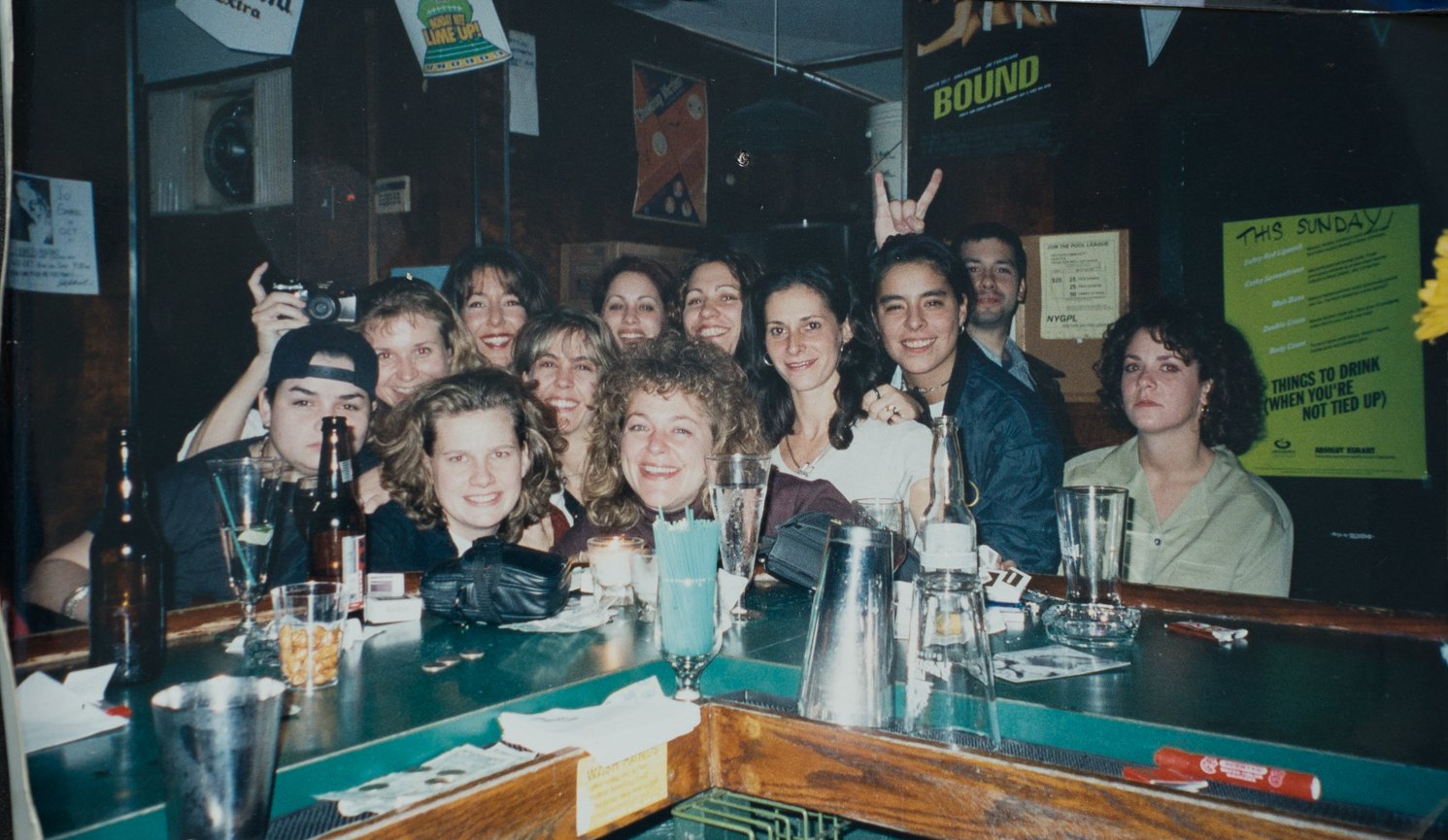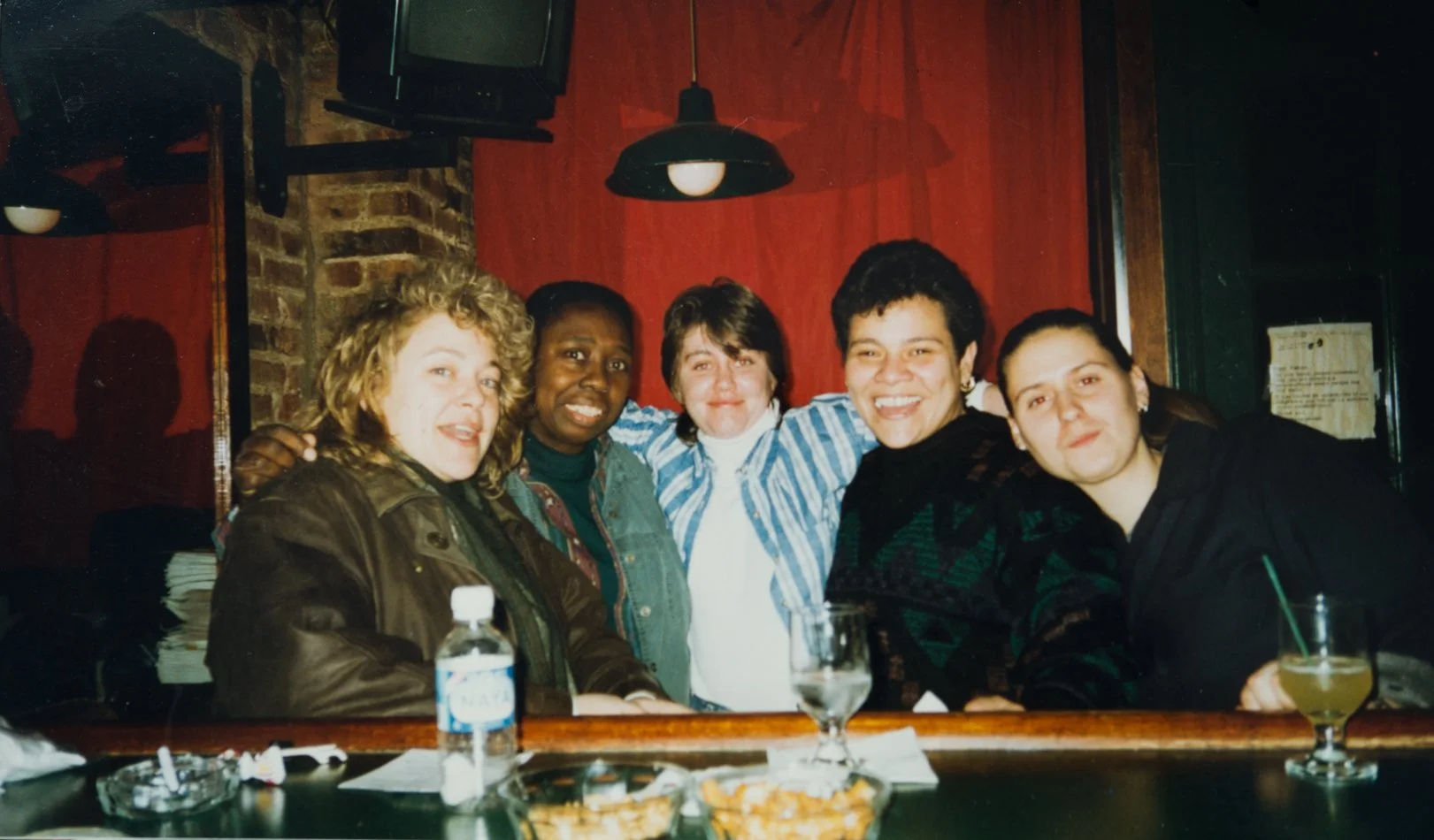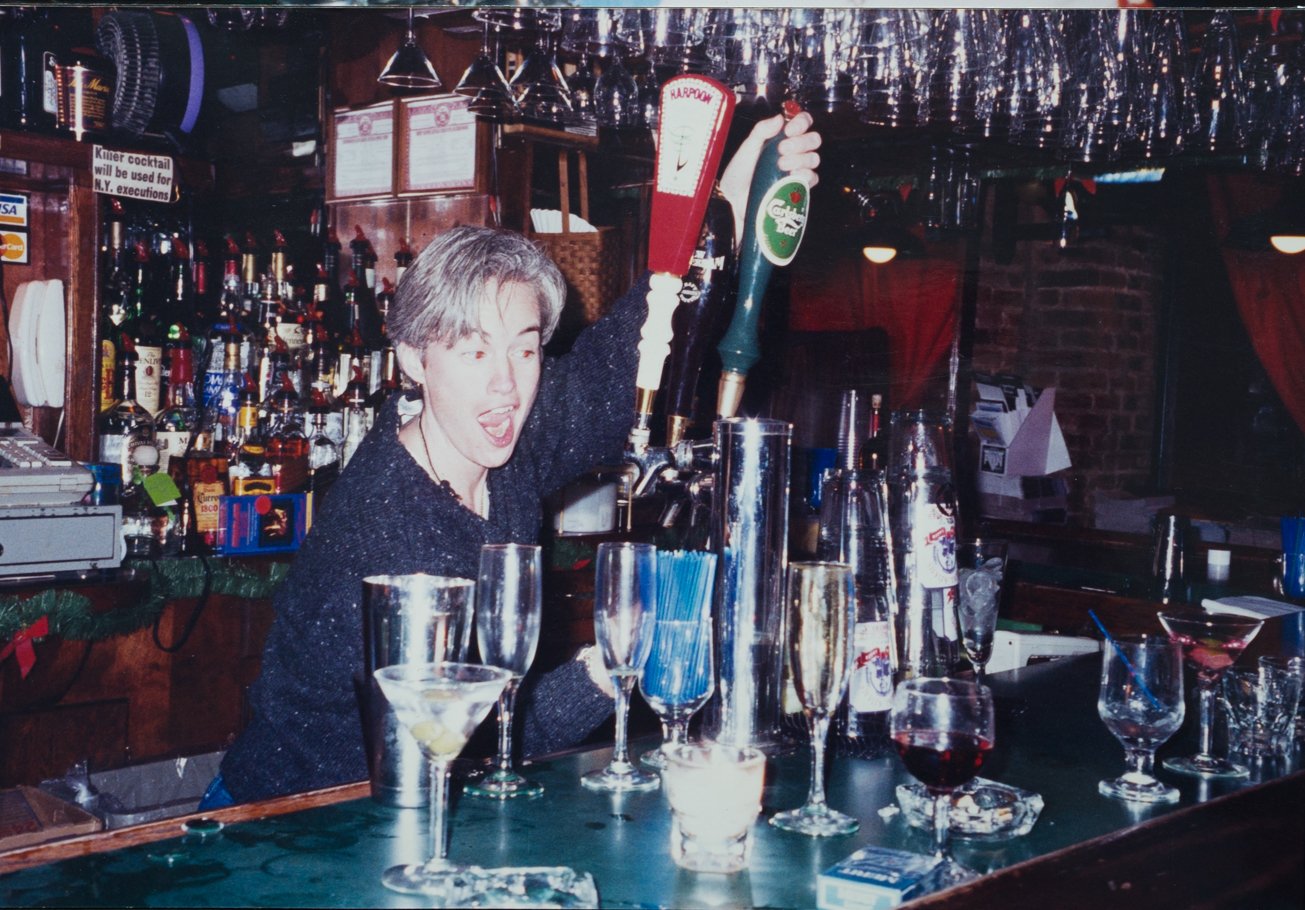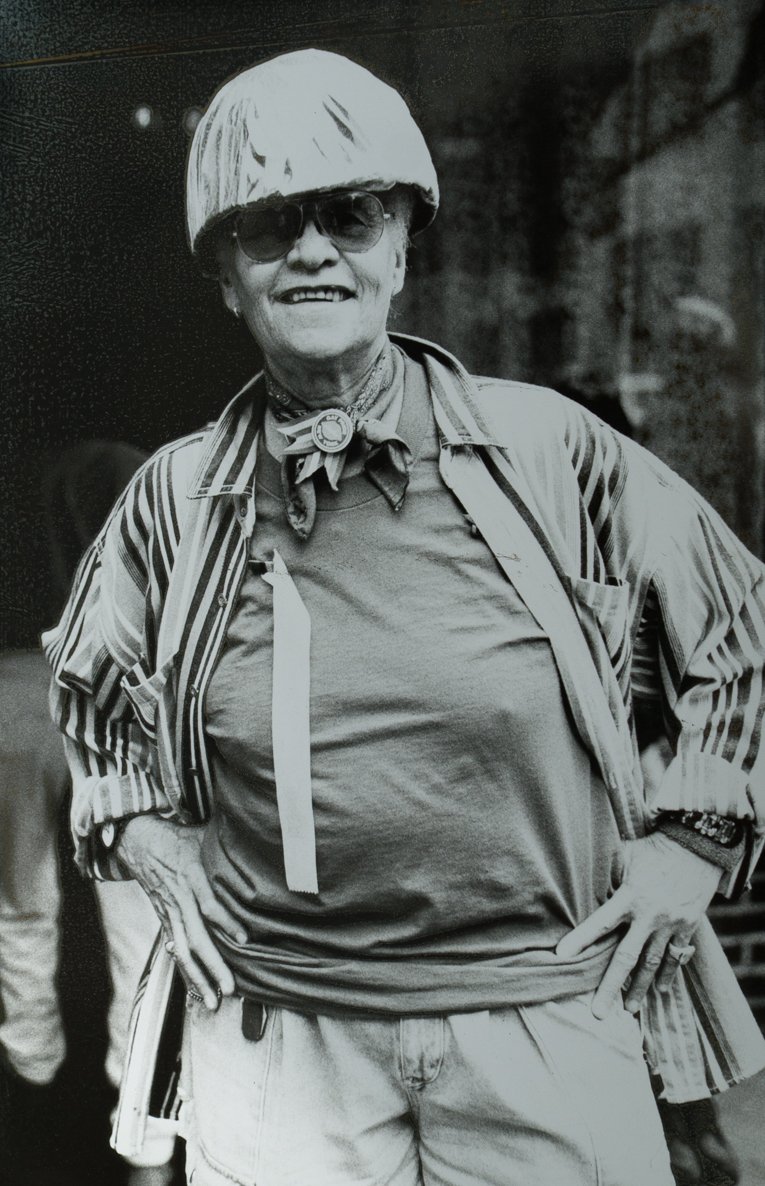Lisa Cannistraci
Lisa Cannistraci is the owner of Henrietta Hudson, a queer and lesbian bar in New York City. Lisa and I spoke on April 26, 2022 at 11am by phone from Brooklyn to Henrietta’s.
Gwen Shockey: The first question I usually ask for these interviews is if you can remember the first place you ever were that was occupied predominantly by queer women or lesbians and what it felt like to be there?
Lisa Cannistraci: Sure. (Smiling) Alight! So, I grew up in Park Slope, Brooklyn, but when I was fifteen my parents decided to move us to Staten Island and my first queer space was a bar that was in the ground floor to a house. It was on… What was it called… God, I can’t remember the name of it. It was just on Instagram… Sandcastle! It was called Sandcastle! It was on Mills Avenue in Staten Island in Midland Beach and it was definitely owned by the mob. One hundred percent. So, it was like the ground floor of a house. It was weird! So, you walk in and there was like a square bar and the bar tender’s in the middle and then in the back there was a dance floor. I’m pretty sure Flashdance came out at the time. That was a big one. Listening to the soundtrack from Flashdance. I remember every… I don’t know what night of the week it was, I wanna say it was Thursdays, but I’m not sure. But, whatever night Dynasty was on they would play Dynasty and we would all get our drinks and go into the dance floor area and sit on the floor and watch Dynasty. You know? (Laughing) And uh, so, that was my first queer, gay bar! I mean, it was like total freedom! You know? Complete freedom! I mean, I quickly graduated to, uh, going into the city and going to, like, the Ice Palace was in the city at the time, which was a great club. I don’t remember where it was of course and, uh, you know hitting the Cubby Hole, when it was the space that is now Henrietta’s, and Paula’s and Kelly’s and, you know. So, yeah! It was just very liberating and like, when you’re just getting in touch with your sexuality and stuff like that and you can hit on somebody! (Laughing) Or somebody could hit on you! You couldn’t do that anywhere else!
GS: That’s just the best.
LC: So, it was Sandcastle! I feel like it was 86 Mills Avenue. I don’t know why that’s coming up but it might not be right.
GS: I love how addresses pop up like that… That’s why I ended up naming my project The Addresses Project. Lisa, you’re Italian, yeah? I’m assuming you come from a Catholic family – was it hard for you to come out?
LC: Sure. So, I’m Italian and Irish. My mom’s dad was Italian and her mom was Irish. My mom was really in tune with the Irish side because she was close with her mom. And my dad was Sicilian. My mom was an avid church goer, you know, and we went to Catholic school and all that stuff. But I remember when I was a little kid I was sitting on the stoop in Brooklyn – I had to be eleven or twelve – just me and my mom and I said, “You know, I’m not getting married.” And she’s like, “Why?” And I go, “I just basically don’t want to be tethered to anybody, you know? I just don’t want to!” I knew that when I was young. So, when I came out, I was just about nineteen and I was forced to come out because I was like dating this woman and we had done some stuff… You know… (Laughing) And her brother was like, “I’m gonna tell Lisa’s parents!” So, I came out to my mom and she just looked at me and she said, “I’ve known since you were very young.” And she said, “It’s fine.” I looked at her and I go, “Why didn’t you tell me?” And she said, “Because life is hard enough and it’s going to be a lot harder. I don’t want you to get gay-bashed.” Basically. This was like 1980. That was that. And, um, it was like nothing! It was another day, you know? It was fine! She was good with it although she said, “I’m not going to tell your father.” And then like an hour later she goes, “No, I’m going to tell him.” It was fine. It was embraced. As far as Catholicism goes and all that, like anything else, anybody who is attached to any religion they take what they like and they leave the rest, right? I remember also when I was young sitting on the stoop with my mom being like… Oh, this is what I said to her too! I remember this. I was like, “You can’t have sex until you get married and then you have to have sex. That seems a little crazy!” I guess I knew I didn’t want to have sex with a guy. And you know, they say you’re not supposed to be gay or whatever, but you’re not supposed to get divorced either and everybody in my family had multiple divorces. So, you know, I always brought that up! But yeah! So, that was that. My mom… What she did when I came out… At that point she had never graduated high school. She went back for her GED later but she would just go buy books when she didn’t understand something. So, I was talking to her one day when we were walking and I said, “So, what would you say if Aunt Sarah asked you if I was gay?” She said, “I’d tell her to ask you!” (Chuckling) I said to her, “You’re so like ok with this!” Back then it wasn’t well received in the larger community. And she said, “It’s easy! It’s really easy! I just take the focus off the sex! Do you really think I want to think about your sister Linda having sex with her boyfriends?” She read that in the book she bought. She bought a book and that’s what it said in the book! She goes, “You are in college! You have an apartment! You have a car! You have a great life! You’re a good person and it’s like one aspect of your life!” And that’s what she said.
GS: Kuddos to her for putting in the time to research and educate herself in order to support you!
LC: And then! I think I was with Diane at the time… It had to be around 1988. I was at Thanksgiving dinner and my mom just gets like excited all of the sudden. She goes, “Oh! Listen, listen guys! Lisa, Laura! Listen!” My younger sister Laura is a lesbian. “They’re doing a study on gay siblings in Washington D.C.! I wanna go! You guys wanna go?” And I said, “Yeah! I’ll go!” Laura was like, “Nah, I don’t wanna go.” I said, “How did you hear about this?” She goes, “PFLAG!” I go, “PFLAG?” She goes, “Yeah! Parents and Friends of Lesbians and Gays! I get the newsletter!” So, she was like really tied in, you know? So, cut to the early 2000s. Everybody was out of the house at the right age, you know what I mean? So, like early 2000s my mother is in Staten Island and she wants to take on a project and she wants to give back to the community and she calls PFLAG and says, “Listen, I want to donate my time to PFLAG. Can you tell me where the meetings are?” And they said, “There is no chapter in Staten Island.” So, she founded it! She started the Staten Island chapter.
GS: Wow! Your mom is a badass!
LC: I know. She was incredible. She was a great woman.
GS: Wow. It just goes to show you that gay children, queer children who get support… I mean, it just makes such a big difference.
LC: Yup!
GS: What did you study in college Lisa?
LC: Psychology! Yeah!
GS: No way! I was interested to hear that Lisa Menichino also studied social work. It makes a lot of sense to me that both of you had these backgrounds doing the community work you do now!
LC: Oh, a hundred percent. You use it every day! I use it for marketing, I use it for engagement… People will reach out to me for a special event – we do a lot of special events – and we host tons of groups and non-profits and private people coming in. After I talk to them for a little while I can kind of figure out what would make them happy and what would be a good fit for them. How to tailor an event to them. So, yeah.
GS: Yeah. Ok, so! You’re nineteen! You’re coming out in Staten Island and you’re discovering the gay bars and you mentioned the former Cubby Hole that is now Henrietta’s was one of your first bars – tell me how you first experienced that space!
LC: I think the first time… I might have come here once before I got hired here. What happened was, I was bartending on Wall Street during The Wolf of Wall Street days – I used to hang out with those lunatics – and it was so extra that I was like, “I have to get the hell out of here.” Back then when you wanted a job you picked up The Village Voice at midnight on Tuesday (that’s when it came out) and you looked at the classifides and then you’d go and stand infront of whatever bar or restaurant it was and wait in line to meet the owner. That’s how you got hired. So, I look at this job that was like four blocks up from Henrietta’s. It was this beautiful restaurant and I was this killer bartender. I mean, to work on Wall Street when the bell rings you have to be good. When that four o’clock bell rings, you’d have like seventy or eighty people in the bar at once. Anyway, the guy was like, “I’d love to hire you but you look too young. I was twenty-two and I looked maybe eighteen. And it was like a fancy restaurant. So, I was walking down Hudson Street and the sky opened up, it started pouring rain, and I ran into this random bar – I thought it was random at least – to get out of the rain and that was the then Cubby Hole. I sat at the bar and there was nobody there, just the bartender, and she goes, “What are you doing out in the rain?” And I told her I was looking for a job. She goes, “We just had a couple of shifts open!” The manager happened to be there, her name was Phyllis, and she hired me on the spot! The moral of that story is that if it didn’t rain that day we wouldn’t be on the phone right now!
GS: Your whole life would have been different! That is wild.
LC: Yup! And this place would never have been here. By the way that was 1985. So, I’ve been here continuously since 1985 except for about nine months when the Cubby Hole was closed and I went up the block and worked at Kelly’s and then I spoke to the landlord and reopened, opening Henrietta’s. So, I’ve essentially been here since 1985.
GS: That is just incredible. When you first started bartending at the original Cubby Hole did Elaine [Romagnoli] own it then?
LC: Yes. Absolutely!
GS: What was your relationship like with her?
LC: So, Elaine was very aloof and like, ominous, and everybody was afraid of her. I wasn’t, though! We had a really good relationship from the start. When I started working at the Cubby Hole, I had the two slowest shifts. I had Monday night and Saturday afternoon. That’s what they had. I still kept my job on Wall Street until I got better shifts. Monday nights within a couple weeks I was ringing a really good register and she noticed. You know, you can’t not notice. Immediately she gave me the keys and she told me to ring out my own register and people who had been there for years weren’t allowed to do that. When she closed Cubby Hole and opened Crazy Nanny’s on 7th Avenue South and Bedford – 21 7th Avenue South – she asked me to be the manager but I told her no. I didn’t want to manage a bar. The bartenders make all the money. And plus, it’s hit and run, you know? So, I declined. Eventually I just left. I didn’t really like the new setup. I went across the street to Kelly’s, worked there for like six months and then me and my business partner Minnie Rivera opened Henrietta Hudson. Everything was by accident really! Nothing was planned.
GS: It’s amazing how the trajectory of one’s life can change! I don’t know if you had planned to be a psychologist but…
LC: I did! I was going to be a clinical psychologist.
GS: What kept you at Cubby Hole for so long?
LC: I was at my other job just as long. I was in college so it was just my job, you know? The money was great, it was fun, it was easy! I made my rent in one night! Rent back then was like three-fifty a month.
GS: Where did you leave back then?
LC: I lived in Bay Ridge, Brooklyn.
GS: Tell me about the shift from Cubby Hole to Henrietta’s.
LC: Well, it wasn’t a shift actually. Cubby Hole closed and then Henrietta’s opened. Henrietta’s was never meant to emulate Cubby Hole. It was supposed to be better. I wanted to make it better. Back in the ‘80s before wine in a box was cool – remember when wine in a box wasn’t cool? Back in the ‘80s all of the lesbian bars had wine in a box and plastic cups and ripped up sheet rock in the bathroom and grafitti, you know? I put tile on the walls, I had beautiful glassware, I had wine with a cork, you know? So, I just wanted to elevate it. I wanted to respect the community and give them a little more.
GS: Yeah! And you were there for so long you probably saw so many shifts in nightlife. It’s wonderful that you wanted to give the community more. I have always felt that at Henrietta’s. What have been some of the biggest shifts you’ve noticed over the decades? Being on the same block and watching people come and go.
LC: Sure, absolutely. (Laughing) I joke around that I’ve been working the same corner for over thirty years! Well, I love it! I love the change! I love that the young kids reclaimed the word queer. I always did my best to have an inclusive venue. The young kids who are coming out today don’t necessarily identify as gay or lesbian. It’s just not how they identify! They identify as queer, as non-binary, whatever the case might be – this is a space for them now. We were a lesbian bar, then we were a lesbian-centric queer human bar, now we’re a queer human bar built by lesbians.
GS: I love that. So, one of the biggest shifts in your opinion has been around identity?
LC: Yeah! And the freedom in that! You know? Not being put in a box! I remember in the ‘80s and definitely in the ‘90s lesbians would not have sex with bisexual women. They were taboo. Oh god no. No. You know? And they were shunned! Like, make up your mind kind of thing. Now that queer has been reclaimed and since the younger generation has the language to be more precise around how they identify – I just think it’s great! It lends itself to be more lighthearted. I feel it here too. It’s more lighthearted! It’s more friendly. There aren’t these factions. You know? I mean remember, it was butch, it was femme. That was it. And now it’s like who’s vers? Who’s gender fluid? It’s definitely a better way to live.
GS: I just have a few more questions and then I’ll let you go! Forgive me if this is too personal but I believe you’re sober right?
LC: Yes I am! Yeah!
GS: Can you tell me a little bit about what it’s been like to be sober and to run a bar?
LC: Sure, yeah! I’m very out about that. I wear it on my sleeve! Um, it’s great! I love it! I, you know, worked on Wall Street and there was a lot of drugs and a lot of booze and a lot of insanity. Pride can be a very dangerous thing, right? Pride can be dangerous. But pride, sometimes, can be helpful. Because I did have a lot of pride before I got sober and so when I was at the bar running the bar I’m not saying I never went a little too over the top but it was something I really, really reeled in and I really monitored. I would come, run the show, get the staff going and then go to my friend’s bars and get crazy or go to a house party, you know? So, I don’t identify Henrietta’s as that place. It was always work for me and being sober here is really easy for me. This is a safe space. And, you know, I have a lot more clarity and I can get things done quicker. Just, like, addiction and alcoholism – they say it’s a family disease, right? Recovery is too. So, when I went into recovery and got sober and came back, it’s like, the way I was acting and how I navigated the space and the people in it kind of blew off onto the staff and they started to think in a more sober way. Right? Yeah. So, I’ll give you an example. I can tell you that most people don’t have a problem with alcohol. Because I see it every day. Somebody comes in, they have a couple drinks, they leave and they’re fine. But there are people who have the disease, right? They’ll wind up drinking too much and maybe saying something really rude or cursing or trying to get volatile, right? I tell my staff, “What do we sell?” And they go, “Alcohol.” (Laughing) But, I’m like listen! We sell the stuff, right? Some people can’t tolerate it! Their bodies can’t tolerate it. When something happens, when they try to offend you or come at you, don’t take it personally. Remember. So, that’s how their attitudes have changed. They’ve become more compassionate when people are, let’s say, in a blackout, right? Or somebody is sick. Or somebody gets a little too poised for like a fight or something. They see that and they look at it differently. They don’t look at it like, “Oh my god, I have to deal with this idiot.” They’re more like, “Alright, I’m just going to deal with this. I’m going to do it calmly and I’m going to get the job done.” In my experience, I know a lot of sober bar owners. We love it! We love what we do. I’m not at risk. I’m in the bar right now. I don’t think about it.
GS: In the many years I’ve been coming to Henrietta’s, your sobriety and your attention to that probably also contributes to the fact that Henrietta’s serves as a community space for so many other functions and purposes not only coming to have drinks.
LC: Oh, a hundred percent. I mean, I did that before I got sober but because I’m sober, I have the bandwidth to like book more events and do more things.
GS: That’s great.
LC: Yeah. Yeah.
GS: So, I guess kind of lastly, I see Henrietta’s over all of these years that it’s been open as this strong community and this safe space and this home where people come back time after time and I’m curious from your perspective what have been the hardest and best things about holding community like you do?
LC: What do you mean by the hardest things?
GS: Holding a space that people really depend on I suppose.
LC: Oh, yeah! So, when COVID hit I could have gone in either direction, right? It was a long thing… I mean, the rent is piling up and my parents were needing a lot of attention. I spent almost the entirety of COVID taking care of my parents, which was great. It was amazing. It was a privilege. I loved every minute of it. But I did consider, like, maybe this is my time! Maybe this is a sign, you know? That didn’t last very long. Henrietta Hudson is not about me. It really isn’t. It hasn’t been for a long time. When I was younger of course I loved it! It was so much fun. I owned a bar! You know? I worked that, right? But it’s been a long time since I felt that way. It is a space for the community and there was no way I was not going to let it reopen and it was a heavy lift. Let me tell you. You know, negotiating with the landlord, putting a team together for the relaunch, trying to find money for that – I only wanted the best people around me with the best energy: intelligent, queer people. I never ask anybody to do something for nothing. I always pay people. I’ve never missed a payroll in thirty-one years. You know, I just figured it out. I figured it out. It was draining, it was taxing, it was exhausting but it was worth it. It was was worth it.
GS: Have the same landlords owned that building the whole time Henrietta’s has been there?
LC: Well, the same landlord’s family, yes. For a while it was the son and the daughter, now it’s the son.
GS: Lastly, Lisa if you could share something you really love about Henrietta’s – whether it’s a memory or something you feel really strongly about in terms of the community space you’ve created?
LC: Sure! So, my favorite thing… So, like I go to bed pretty early. I get up when the bar’s closing. I’m usually up at five, five-thirty in the morning and they’re just closing up and going home. I live on top of the bar and I walk my dogs every night and one of my favorite things in the world – and I do it a lot – is as I’m walking past, I just see so many happy people. I get to have that experience. I get to have that experience any time I want it. Or I’ll walk by and have somebody hold the dogs and just open the door and take a peek inside and just see everybody smiling and jumping up and down and doing whatever they’re doing and I just say to myself, “You know, your work is done.” That’s what drives me. The joy! The joy I see. And the freedom! The freedom I see in these young people. That I can have that any time I want, that I can extract that joy – all I have to do is walk in the bar and look around.
GS: That’s amazing Lisa. Thank you, thank you so much for your amazing work and the space you hold.


